
Cedars-Sinai has been tapped to play a critical role in bolstering the country’s front line of defense against Ebola and other highly infectious diseases under a federal grant announced today.
The $3.25 million grant from the U.S. Department of Health and Human Services is intended to improve the response to emerging medical threats and will be shared by Cedars-Sinai and the state Department of Public Health.
Cedars-Sinai and the state agency will be part of a national network of 10 regional treatment centers. The hospital will handle patients from California, Arizona, Nevada, Hawaii and the U.S. territories in the Pacific.
“We are honored to take on this important leadership role in the nation’s healthcare system,” said Thomas M. Priselac, Cedars-Sinai’s president and CEO. “Doing so is consistent with our mission and commitment to the community and beyond in light of our role as a national leader providing the most advanced treatments to acutely ill patients with complex medical conditions from California and across America.”
As a regional treatment center, Cedars-Sinai has agreed to:
— receive patients with severe infectious diseases within eight hours of notification;
— maintain infectious disease isolation capacity or negative-pressure rooms that prevent the spread of microorganisms;
— treat up to two Ebola patients concurrently; and
— ccept patients from outside its region or those medically evacuated to the U.S. from overseas.
Cedars-Sinai will use the grant primarily to fund ongoing training of its Ebola Response Team and to buy medical equipment and personal protective gear. The medical center is also planning to conduct quarterly staff training sessions and preparedness drills during the grant period, which runs through 2019.
The federal grant is part of $339.5 million in emergency funding appropriated by Congress in 2014 to ensure that the nation’s healthcare system is prepared to treat future patients with Ebola or other highly infectious pathogens.
“Ensuring the safety of all Cedars-Sinai patients, visitors and staff is our top priority,” said Dr. Rekha Murthy, medical director of Hospital Epidemiology and professor of medicine in the Division of Infectious Diseases at Cedars-Sinai.
“Members of our Ebola Response Team will employ the most effective protocols and the best practices available to care for all of our patients and to maximize safety when dealing with infectious diseases,” Murthy said.





















